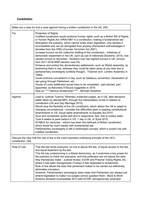Constitution
Make out a case for and a case against having a written constitution in the UK. [30]
For Protection of Rights
Codified constitution would enshrine human rights, such as a British Bill of Rights,
or Human Rights Act (HRA)1997 in a constitution, making it fundamental law -
Strengthen the judiciary, which cannot strike down legislation, only declare it
incompatible and can be derogated from anyway (Parliament acknowledges it
deviates from the HRA) (Counter Terrorism Act 2001).
Increase turnout via the collective drafting of the constitution - initiatives of
democratic experiment in the UK, such as use of referenda (Scotland, 2014), has
caused turnout to skyrocket - Scotland now has highest turnout in UK, turnout
from 2011-2016 MSP election rose 5%.
Enhance and protect the devolutionary settlements, such as Welsh assembly, by
enshrining them in law, whereas they c ould be taken away at any time due to
parliamentary sovereignty (unlikely though) - Thatcher and London Assembly in
1980s.
Could enshrine conventions in law, such as Salisbury convention, Declaration of
war going through Parliament, etc.
House of Lords settlement would have to be completed - part elected, part
appointed, as Baroness D’Souza suggested in 2016
Stop an *****elective dictatorship***** - Michael Heseltine
Against Lead to “judicial Tyranny” Whereby unelected judges, as in US, take decisions
better taken by elected MPs, through the interpretation of law in relation to
constitution (US and Gay Marriage 2015).
Would stop the flexibility of the UK constitution, which allows the UK to adapt to
changing circumstances - consider the difficulties seen in passing constitutional
amendments in US; Equal rights amendments vs Equality Act 2010.
Govt and constitution works well and is responsive, fast, due to unitary state -
Took 6 weeks to pass bailout in US, 1 day in UK, or Syria 2015.
STABLE for centuries - reform has been the hallmark of British constitution,
which would be much harder with fundamental law.
Parliamentary sovereignty is still a meaningful concept, which it couldn’t be with
codified constitution.
Discuss the view that the rule of law is the most important underlying principle of the UK’s
constitution. [30]
Rule of Law That the law binds everyone, no one is above the law, of equal access to the law,
and equal treatment by the law.
This the key underpinning in a liberal democracy, as it enshrines a key power for
the judiciary to check the executive, and that politicians are not above the laws
they themselves make - Judicial review; ECHR and Prisoner Voting Rights, etc. -
where it has been transgressed (Turkey) it has regressed to dictatorship.
Rule of law allows the laws that parliament makes to be carried out effectively,
eliminates corruption.
However, Parliamentary sovereignty does mean that Parliament can always just
amend legislation to make it so judges cannot question them - Back to Work
Scheme declared incompatible 2013 with ECHR, retrospectively amended




